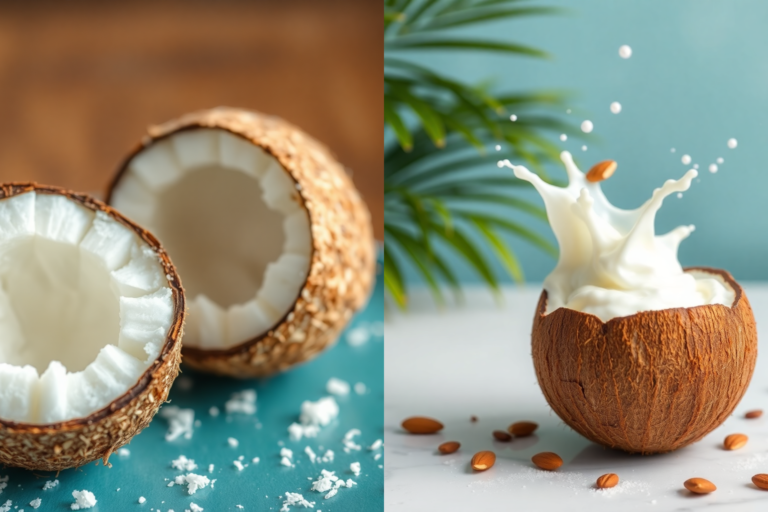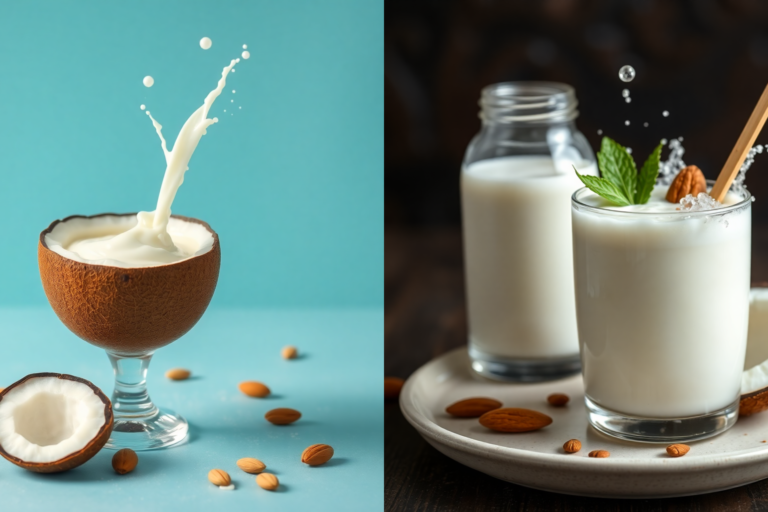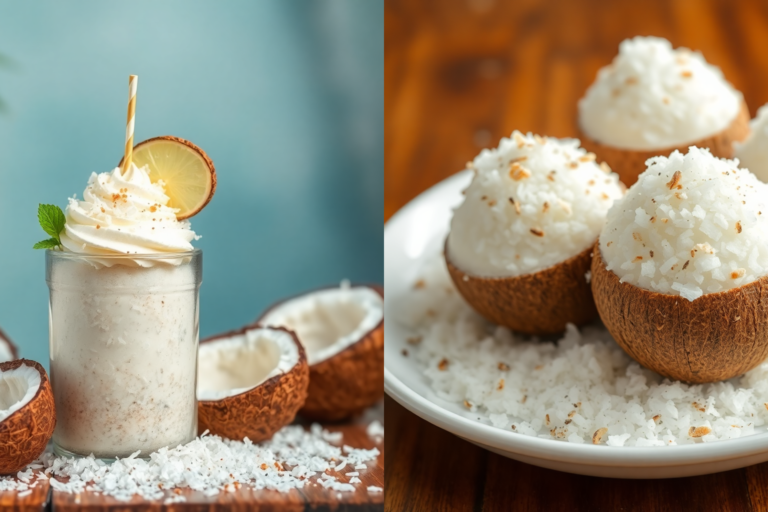Introduction of Coconut Butter vs Coconut Oil
In the realm of natural food products, coconut butter and coconut oil have gained significant popularity for their versatile uses and health benefits. Coconut butter is made by pureeing the flesh of the coconut, which retains its fiber and nutritional content. This creamy substance offers a rich, buttery texture, making it an excellent addition to smoothies, baked goods, and spreads. On the other hand, coconut oil is extracted from the meat of the coconut, resulting in a clear, liquid fat that is commonly used in cooking, baking, and skin care. Unlike coconut butter, coconut oil is predominantly composed of saturated fats, which contributes to its distinct cooking properties and flavor.
Understanding the differences between coconut butter and coconut oil is crucial for consumers looking to maximize their health benefits. While both products share similarities, they have unique nutritional profiles and culinary applications. Coconut butter contains fiber and healthy fats that support digestion and satiety, while coconut oil is known for its high medium-chain triglycerides (MCTs), which can provide quick energy and support metabolism. By discerning these differences, individuals can make informed choices based on their dietary needs and cooking preferences.
The purpose of this article is to debunk common myths surrounding coconut butter and coconut oil, clarifying misconceptions that may lead to confusion among consumers. For instance, some people may believe that both products can be used interchangeably, but their distinct properties make them suitable for different uses. By exploring the nuances of Coconut Butter vs Coconut Oil, readers will gain valuable insights into how to incorporate these coconut-derived products into their diets effectively.
Myth 1: Coconut Butter and Coconut Oil are the Same
Understanding the Differences in Composition
One of the most common misconceptions surrounding coconut-based products is that coconut butter and coconut oil are interchangeable. However, when exploring the topic of Coconut Butter vs Coconut Oil, it becomes clear that these two products are quite distinct in their composition and nutritional profiles.
Coconut oil is derived solely from the fat content of the coconut meat. It is extracted through processes such as cold-pressing or expeller-pressing fresh coconut meat or copra (dried coconut). The result is a clear, viscous oil that is predominantly made up of saturated fats, primarily medium-chain triglycerides (MCTs). This fat content gives coconut oil its high calorie density and stability at room temperature, making it an excellent choice for cooking, baking, and frying.
In contrast, coconut butter is made from the whole coconut meat, which is blended until it becomes a smooth, creamy spread. It retains all the fiber, protein, and nutrients found in the coconut flesh, in addition to its fat content. This composition is why the discussion of Coconut Butter vs Coconut Oil highlights the health benefits associated with the higher fiber and protein content found in coconut butter.
Derivation from Coconuts
To clarify the process of derivation when comparing Coconut Butter vs Coconut Oil, it is important to understand how each product is produced.
Coconut Oil: The extraction of coconut oil involves separating the oil from the meat of the coconut. Depending on the extraction method, the oil can be refined, virgin, or extra virgin, affecting its flavor, aroma, and nutritional properties. The primary focus here is on obtaining the fat, which is then filtered and packaged.
Coconut Butter: On the other hand, coconut butter is made by grinding the dried coconut meat until it reaches a creamy consistency. Unlike coconut oil, which is purely fat, coconut butter retains the solid components of the coconut, resulting in a thicker, more textured spread. This process preserves the natural sweetness and flavor of the coconut, providing a unique taste experience when compared to coconut oil.
Nutritional Comparison
When discussing Coconut Butter vs Coconut Oil, it’s essential to consider their nutritional differences. Coconut oil offers a concentrated source of fat, which can provide quick energy, particularly beneficial for athletes or those following a ketogenic diet. In contrast, coconut butter provides a more balanced nutrient profile, offering healthy fats, fiber, and essential vitamins and minerals that contribute to overall health.
In summary, while coconut butter and coconut oil both originate from coconuts, their differences in composition and production methods underscore that they serve different culinary and nutritional purposes. Understanding these distinctions can help consumers make informed choices about which product to use in their cooking and dietary plans.
Myth 2: Coconut Butter is Healthier than Coconut Oil
Nutritional Comparison of Coconut Butter vs Coconut Oil
When comparing Coconut Butter vs Coconut Oil, it’s essential to understand their distinct nutritional profiles. Coconut Oil is extracted from the fat of fresh coconut meat, resulting in a product that is primarily made up of saturated fats. It contains medium-chain triglycerides (MCTs), particularly lauric acid, which can provide quick energy and may aid in weight management by increasing metabolism. One tablespoon of coconut oil typically contains about 117 calories and 13.5 grams of fat, with a negligible amount of carbohydrates or protein.
In contrast, Coconut Butter is made by pureeing the whole coconut flesh, which includes both fat and fiber. This means it retains more of the coconut’s nutritional benefits. A tablespoon of coconut butter contains approximately 100 calories, 9 grams of fat, and about 4 grams of carbohydrates, including 2 grams of fiber. The fiber content in coconut butter may promote digestive health, making it a nutritious choice for many. Therefore, in the Coconut Butter vs Coconut Oil debate, the higher fiber content of coconut butter stands out as a significant difference.
Health Benefits of Coconut Butter vs Coconut Oil
While both Coconut Butter and Coconut Oil offer health benefits, they serve different purposes in the kitchen and dietary routines. Coconut Oil is celebrated for its versatility and high smoke point, making it ideal for cooking and baking. Its MCTs can also support quick energy release and may aid in ketone production for those following a ketogenic diet.
On the other hand, Coconut Butter is rich in the whole coconut’s nutrients, offering a creamy texture and natural sweetness that enhances smoothies, desserts, and spreads. It provides essential minerals such as magnesium and potassium, supporting various bodily functions. The healthy fats in both Coconut Butter vs Coconut Oil contribute to heart health, but the added fiber in coconut butter makes it a more filling option.
Uses of Coconut Butter vs Coconut Oil
When considering Coconut Butter vs Coconut Oil, their uses can also vary significantly. Coconut Oil is best suited for cooking, sautéing, and frying due to its high smoke point and stability at high temperatures. It can also be used in skincare and haircare products because of its moisturizing properties.
Conversely, Coconut Butter shines in recipes that require a creamy texture, such as smoothies, energy bars, and baked goods. It can be spread on toast, added to oatmeal, or used as a topping for desserts, making it a delicious way to enhance flavor while benefiting from its nutritional properties.
Myth 3: Coconut Oil Should Always be Avoided
Overview of Misconceptions About Saturated Fats
The belief that all saturated fats are harmful has been widely circulated, leading to a stigma surrounding the consumption of products like coconut oil. This misconception is rooted in earlier dietary guidelines that categorized fats into “good” and “bad” without considering the context of different fat sources. Coconut oil, derived from the meat of mature coconuts, contains a high percentage of saturated fats, primarily medium-chain triglycerides (MCTs), which are metabolized differently than long-chain fatty acids found in animal fats.
Recent research suggests that not all saturated fats are created equal. While it’s essential to limit unhealthy fats, moderate consumption of certain saturated fats, such as those found in coconut oil, may offer health benefits. The unique structure of MCTs allows them to be rapidly absorbed and utilized by the body for energy rather than being stored as fat. This has sparked interest in the potential positive effects of coconut oil on metabolism, weight management, and even heart health.
Evidence Supporting the Benefits of Coconut Oil in Moderation
Studies indicate that incorporating coconut oil into a balanced diet can have several advantages. For instance, research has shown that coconut oil may improve lipid profiles by increasing HDL (good) cholesterol levels while maintaining or slightly increasing LDL (bad) cholesterol levels. This suggests that, when consumed in moderation, coconut oil might contribute positively to cardiovascular health.
Moreover, coconut oil’s MCT content may aid in weight management. MCTs can promote a feeling of fullness, potentially leading to reduced overall calorie intake. Additionally, they have been shown to increase energy expenditure, making coconut oil a unique player in the discussion around healthy fats.
It is important to consider the distinction between coconut butter and coconut oil. While both are derived from coconuts, they serve different culinary and nutritional purposes. Coconut oil is primarily fat, making it a concentrated source of energy, while coconut butter contains both fat and fiber, offering a more substantial nutritional profile.
In moderation, coconut oil can enhance cooking and baking, adding a rich flavor and unique properties to various dishes. However, as with any fat, moderation is key. Incorporating a variety of healthy fats, including coconut butter and coconut oil, into your diet can lead to a more balanced nutrient intake.
Myth 4: Coconut Butter is Only for Spreading
The Versatile Uses of Coconut Butter in Cooking and Baking
Coconut butter is often mistakenly viewed as a mere spread, akin to peanut butter or almond butter. However, this misconception undermines the incredible versatility of coconut butter. In the ongoing conversation about coconut butter vs coconut oil, it’s essential to recognize that while both products come from the coconut, their uses in the kitchen vary significantly. Coconut butter, made from the whole coconut flesh, includes both the fat and the fiber, making it a nutrient-dense ingredient that can elevate your culinary creations.
Cooking with Coconut Butter
Coconut butter can be an exceptional base for various dishes. Its creamy texture and subtly sweet flavor lend themselves beautifully to cooking. Here are some ways to incorporate coconut butter into your meals:
Sauces and Dressings: Coconut butter can be blended with herbs and spices to create rich sauces or dressings, offering a creamy consistency that enhances the flavors of salads and roasted vegetables. When discussing coconut butter vs coconut oil, it’s important to note that coconut oil lacks the fibrous texture and sweetness that coconut butter provides, making the latter a superior choice for creamy dressings.
Smoothies: Adding a spoonful of coconut butter to your smoothie can provide a silky texture and added nutrition. This makes it an excellent choice for those looking to boost their healthy fat intake, particularly when compared to coconut oil, which does not offer the same fiber content.
Cooking Grains: Mixing coconut butter into cooked grains, like rice or quinoa, infuses them with a delightful coconut flavor while enhancing their nutritional profile. This versatility is a major point in the coconut butter vs coconut oil discussion, as coconut oil primarily contributes fat without the additional nutrients found in coconut butter.
Baking with Coconut Butter
When it comes to baking, coconut butter is an invaluable ingredient. It can be used in various recipes, offering moisture and a unique flavor profile that can enhance both sweet and savory baked goods.
Cookies and Bars: Coconut butter can replace traditional fats in cookie and energy bar recipes. It adds a delightful chewiness and richness, making it a favorite among health-conscious bakers. In the context of coconut butter vs coconut oil, coconut butter contributes not only fat but also fiber, which helps create a satisfying texture in baked goods.
Cakes and Muffins: Incorporating coconut butter into cake and muffin batters results in a moist crumb and a hint of natural sweetness. The fiber content in coconut butter can also aid in achieving a more balanced baked product, as opposed to using coconut oil, which does not provide the same benefits.
Pancakes and Waffles: Using coconut butter in pancake or waffle batter can add depth and flavor, turning a simple breakfast into a gourmet meal. The distinct taste of coconut butter contrasts beautifully with maple syrup, creating a delightful flavor pairing that coconut oil alone cannot match.
Highlighting Its Role in Recipes and Skincare
Beyond the kitchen, coconut butter holds a prominent place in the realm of skincare. Its nourishing properties make it an excellent choice for natural beauty routines, offering a range of benefits that are distinct from those provided by coconut oil.
Skincare Benefits of Coconut Butter
Moisturizer: Coconut butter serves as a rich moisturizer for the skin, helping to hydrate and nourish even the driest areas. The natural fats and fibers in coconut butter work together to create a barrier that locks in moisture, making it ideal for those seeking hydration. This attribute further differentiates coconut butter from coconut oil, as the latter may provide hydration but lacks the same creamy texture.
Lip Balm: When applied to the lips, coconut butter acts as a protective barrier against dryness and chapping. Its thick consistency makes it an excellent natural lip balm, ideal for maintaining soft, supple lips throughout the day. In contrast, while coconut oil can also be used as a lip treatment, it tends to be less effective at providing the same level of moisture retention.
DIY Beauty Products: Coconut butter can be incorporated into various DIY beauty recipes, such as body scrubs and balms, adding not only nourishing benefits but also a luxurious texture. The ability of coconut butter to blend well with other natural ingredients makes it a staple in homemade beauty treatments, further emphasizing the unique qualities of coconut butter when compared to coconut oil.
Myth 5: Both Products Have the Same Culinary Uses
Understanding the Differences: Coconut Butter vs Coconut Oil
While coconut butter and coconut oil are often used interchangeably in recipes, they possess distinct characteristics that influence their culinary applications. Coconut Butter vs Coconut Oil is a comparison that highlights not only their differences in flavor and texture but also their unique cooking properties.
Flavor Profiles and Cooking Applications
Coconut Butter: Rich and Creamy
- Flavor: Coconut butter has a rich, creamy texture and a pronounced coconut flavor, making it an ideal addition to recipes where a coconut taste is desired. The presence of coconut meat gives it a nutty and slightly sweet flavor profile that can enhance desserts and snacks.
- Culinary Uses: This product is perfect for baking and spreading. It’s commonly used in:
- Smoothies: Adding a spoonful of coconut butter to smoothies provides creaminess and a boost of flavor.
- Energy Bars: Its rich consistency works well in homemade energy bars, contributing to a chewy texture.
- Baked Goods: Incorporating coconut butter in cookies, cakes, and brownies adds moisture and enhances flavor.
Coconut Oil: Versatile and Neutral
- Flavor: Unlike coconut butter, coconut oil has a mild flavor when refined, allowing it to blend seamlessly into various dishes without overpowering them. The unrefined version retains a hint of coconut taste but is still quite neutral compared to coconut butter.
- Culinary Uses: Coconut oil is incredibly versatile and can be used for:
- Cooking and Sautéing: Its high smoke point makes it ideal for frying and sautéing vegetables or proteins.
- Baking: While it can replace butter or other oils in baking recipes, it won’t impart the same creamy flavor as coconut butter.
- Popcorn and Dressings: Coconut oil can add a subtle coconut flavor when drizzled over popcorn or used in salad dressings.
Recommendations for Using Each in the Kitchen
When to Use Coconut Butter:
- Opt for coconut butter when you want to infuse your dish with a rich coconut flavor. It’s excellent in sweet recipes or when a creamy texture is required. For example, use coconut butter in raw desserts, like energy bars, or as a topping for pancakes and waffles.
When to Use Coconut Oil:
- Choose coconut oil for general cooking needs, especially when frying or baking. Its neutral flavor makes it a great base for sautéing vegetables or creating a lighter, healthier alternative to butter in savory dishes.
Conclusion: Understanding Coconut Butter vs Coconut Oil
In this article, we’ve explored the key differences and similarities between coconut butter vs coconut oil, highlighting their unique properties, nutritional benefits, and culinary uses. Coconut butter is made from whole coconut flesh, offering a rich, creamy texture and a slightly sweet flavor, making it ideal for spreads, baking, and adding to smoothies. In contrast, coconut oil, extracted from the dried coconut meat, is primarily a fat source, widely used for cooking and skincare due to its high smoke point and moisturizing properties.
Both products have distinct benefits, making them valuable additions to your pantry. When considering which to incorporate into your diet or beauty routine, it ultimately depends on your individual needs and preferences. If you’re looking for a nutrient-dense option that adds texture and flavor to your dishes, coconut butter might be the right choice. On the other hand, if you seek a versatile cooking oil or a natural moisturizer, coconut oil may suit you better.
We encourage you to experiment with both coconut butter vs coconut oil in your recipes and personal care routines. Each has its unique qualities that can enhance your health and culinary experiences.
We would love to hear from you! Please share your experiences with coconut butter vs coconut oil in the comments below. If you have any questions or need further clarification on their uses and benefits, feel free to ask. Your insights can help others in their journey toward healthier choices.











